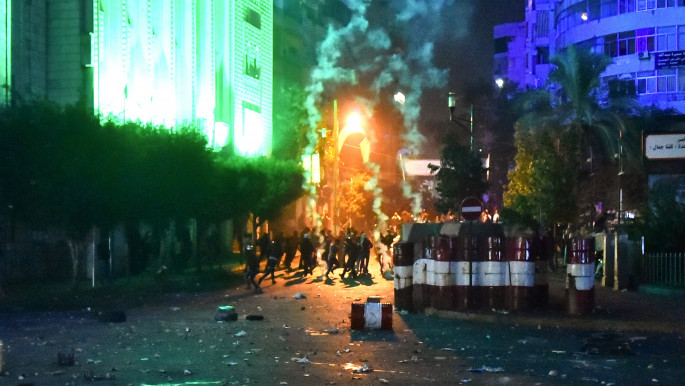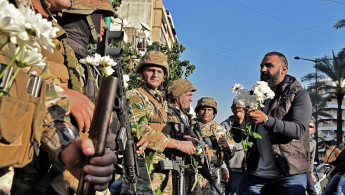Follow us on Twitter and Instagram to stay connected
Lebanese people use social media to help each other as economic, mental health crisis looms
Lebanese people are utilising social media to organise and launch aid-giving drives as the economic situation in the country worsens.
5 min read
Protesters giving flowers to soldiers [Getty]
Lebanese people are using social media to help those who are struggling over the economic crisis sweeping across the country as a result of anti-government protests and political gridlock.
Students who are part of a WhatsApp group that aims to organise the country's citizens launched a campaign appealing for donations after a father-of-two expressed his intention to take his own life over his dire economic circumstances.
Mohamed Shkeir, a 23-year-old architecture student, along with friends has been involved in helping him and others suffering. The friends posted an ad on social media and, to show transparency, created a spreadsheet to track the money.
As Lebanon’s protest movement enters its third month, the economic pinch is hurting everyone. Layoffs are increasing, salary cuts are the norm, banks are capping withdrawals and prices are quickly rising. The euphoria that marked the first days of the protests is being replaced with a slow sense of despair.
With the entrenched political class failing to chart a way out, Lebanese are resorting to what they’ve done in previous wars and crises: they rely on each other, not the state.
“We got to a situation where people are not able to buy food for their kids or pay their rent,” Shkeir said.
The friend who needed help “said he had no money and what is the revolution doing about it and asked why the politicians are not paying attention,” Shkeir said.
They were able to convince him not to kill himself, though he refused to take any donations. Shkeir and his group continued their campaign, giving money, food, clothes and supplies to 58 families so far this month, including one family reduced to using candles because they can’t afford electricity.
Charities are not enough
Over recent years as Lebanon’s economy worsened, people turned to familiar ways to cope, including mosque and church charities or helping each other, forgiving debts or handing out food. Now, those means have already been stretched thin.
The protests — and the 24-hour news cycle focused on them — have brought a surge of help by rallying public attention to the suffering. Campaigns to collect food, winter clothes and helplines for people in economic and emotional distress are popping up everywhere, intensified by the Christmas spirit.
Stores have offered discounts and set up boxes for donations of clothes or money. Ads on TV urged Lebanese to pack bags of donations instead of suitcases for travel. Another urged Lebanese in the diaspora coming home to visit to bring “medicines, clothes and goodies” to give, because “Lebanon needs help.”
Some restaurants have offered to deliver free food, and bakeries put out bread for anyone who needs.
A yoga studio organised classes to fundraise for the needy. WhatsApp groups and Instagram pages shared addresses of local small businesses for shoppers to use for Christmas gifts.
“We are all in this together,” said one tagline. A group of web developers created an app, Khayyak or Your Brother, to coordinate between those who want to help and those in need. “Don’t lose hope, you are not alone,” the advertisement for the app said.
Read More: Closing the decade: 10 events that drastically changed the Middle East
The protests have created a unique experience — “something for everybody,” whether they support or oppose the revolt, said Mia Atwi, a clinical psychologist.
“People feel more that they are all suffering the same thing, the rich and the poor ... a common kind of loss,” she said.
Atwi is co-founder of Lebanon’s Embrace, a mental health organization operating the national suicide prevention helpline. The helpline now receives 100 calls a week, up from up to 10 before reports of suicides or attempted suicides first erupted three weeks ago.
Worsening political situation
Atwi attributed the jump to the spike of media and public attention to the issue of suicide, something she said has saved lives.
Calls even come from rural areas, not just Beirut as they did in the past. Still, the government hasn’t given her organisation a toll-free number, despite paying $25,000 a year for the four-digit helpline.
Many campaigns have sprung out of the protest movement. Weekly clothes donations and distributions were set up in the downtown Beirut squares at the epicenter of the demonstrations and near the Central Bank, which protesters accuse of corruption and fueling the economic crisis.
“We only have each other” proclaims the campaign’s hashtag, a snub of the political class and the state.
Rim Majid, a 21-year old student, quit university in Beirut to participate in “everything revolution.” After hearing of news of the man’s suicide in early December, she set up a griddle at a downtown protest site to make free manousheh, a traditional Lebanese flatbread. Next to the griddle is a donation box with the man’s name. Someone donated enough wheat for a week of baking.
“The suffering existed before, but now we are going through a crisis, one that will only get worse,” she said.
Lebanon's caretaker finance minister accused the country's banks on Tuesday of "trapping" civil servants' salaries with withdrawal limits that have fuelled public anger in the crisis-stricken country.
"What is happening in some Lebanese banks is unacceptable," Ali Hassan Khalil wrote on Twitter.
"They are trapping the salaries of (state) employees that are transferred by the finance ministry every month."
Rocked by two months of anti-government protests and a political deadlock, Lebanon is also facing its worst economic crisis since the 1975-1990 civil war.
A liquidity crunch has pushed Lebanese banks to impose capital controls.
Students who are part of a WhatsApp group that aims to organise the country's citizens launched a campaign appealing for donations after a father-of-two expressed his intention to take his own life over his dire economic circumstances.
Mohamed Shkeir, a 23-year-old architecture student, along with friends has been involved in helping him and others suffering. The friends posted an ad on social media and, to show transparency, created a spreadsheet to track the money.
As Lebanon’s protest movement enters its third month, the economic pinch is hurting everyone. Layoffs are increasing, salary cuts are the norm, banks are capping withdrawals and prices are quickly rising. The euphoria that marked the first days of the protests is being replaced with a slow sense of despair.
With the entrenched political class failing to chart a way out, Lebanese are resorting to what they’ve done in previous wars and crises: they rely on each other, not the state.
“We got to a situation where people are not able to buy food for their kids or pay their rent,” Shkeir said.
The friend who needed help “said he had no money and what is the revolution doing about it and asked why the politicians are not paying attention,” Shkeir said.
They were able to convince him not to kill himself, though he refused to take any donations. Shkeir and his group continued their campaign, giving money, food, clothes and supplies to 58 families so far this month, including one family reduced to using candles because they can’t afford electricity.
 |
| Protests continue to rage [Getty] |
Charities are not enough
Over recent years as Lebanon’s economy worsened, people turned to familiar ways to cope, including mosque and church charities or helping each other, forgiving debts or handing out food. Now, those means have already been stretched thin.
The protests — and the 24-hour news cycle focused on them — have brought a surge of help by rallying public attention to the suffering. Campaigns to collect food, winter clothes and helplines for people in economic and emotional distress are popping up everywhere, intensified by the Christmas spirit.
Stores have offered discounts and set up boxes for donations of clothes or money. Ads on TV urged Lebanese to pack bags of donations instead of suitcases for travel. Another urged Lebanese in the diaspora coming home to visit to bring “medicines, clothes and goodies” to give, because “Lebanon needs help.”
Some restaurants have offered to deliver free food, and bakeries put out bread for anyone who needs.
A yoga studio organised classes to fundraise for the needy. WhatsApp groups and Instagram pages shared addresses of local small businesses for shoppers to use for Christmas gifts.
“We are all in this together,” said one tagline. A group of web developers created an app, Khayyak or Your Brother, to coordinate between those who want to help and those in need. “Don’t lose hope, you are not alone,” the advertisement for the app said.
Read More: Closing the decade: 10 events that drastically changed the Middle East
The protests have created a unique experience — “something for everybody,” whether they support or oppose the revolt, said Mia Atwi, a clinical psychologist.
“People feel more that they are all suffering the same thing, the rich and the poor ... a common kind of loss,” she said.
Atwi is co-founder of Lebanon’s Embrace, a mental health organization operating the national suicide prevention helpline. The helpline now receives 100 calls a week, up from up to 10 before reports of suicides or attempted suicides first erupted three weeks ago.
Worsening political situation
Atwi attributed the jump to the spike of media and public attention to the issue of suicide, something she said has saved lives.
Calls even come from rural areas, not just Beirut as they did in the past. Still, the government hasn’t given her organisation a toll-free number, despite paying $25,000 a year for the four-digit helpline.
Many campaigns have sprung out of the protest movement. Weekly clothes donations and distributions were set up in the downtown Beirut squares at the epicenter of the demonstrations and near the Central Bank, which protesters accuse of corruption and fueling the economic crisis.
“We only have each other” proclaims the campaign’s hashtag, a snub of the political class and the state.
Rim Majid, a 21-year old student, quit university in Beirut to participate in “everything revolution.” After hearing of news of the man’s suicide in early December, she set up a griddle at a downtown protest site to make free manousheh, a traditional Lebanese flatbread. Next to the griddle is a donation box with the man’s name. Someone donated enough wheat for a week of baking.
|
“The suffering existed before, but now we are going through a crisis, one that will only get worse,” she said.
Lebanon's caretaker finance minister accused the country's banks on Tuesday of "trapping" civil servants' salaries with withdrawal limits that have fuelled public anger in the crisis-stricken country.
"What is happening in some Lebanese banks is unacceptable," Ali Hassan Khalil wrote on Twitter.
"They are trapping the salaries of (state) employees that are transferred by the finance ministry every month."
Rocked by two months of anti-government protests and a political deadlock, Lebanon is also facing its worst economic crisis since the 1975-1990 civil war.
A liquidity crunch has pushed Lebanese banks to impose capital controls.





 Follow the Middle East's top stories in English at The New Arab on Google News
Follow the Middle East's top stories in English at The New Arab on Google News
![Israeli forces ordered bombed Gaza's Jabalia, ordering residents to leave [Getty]](/sites/default/files/styles/image_330x185/public/2176418030.jpeg?h=a5f2f23a&itok=_YGZaP1z)

